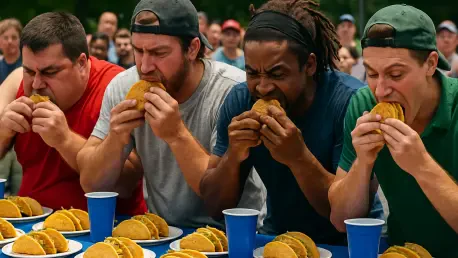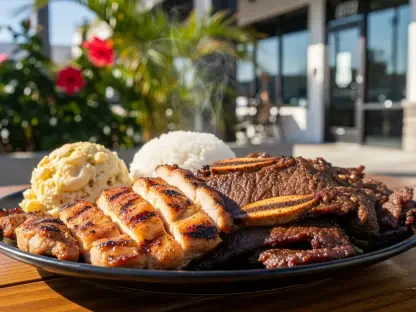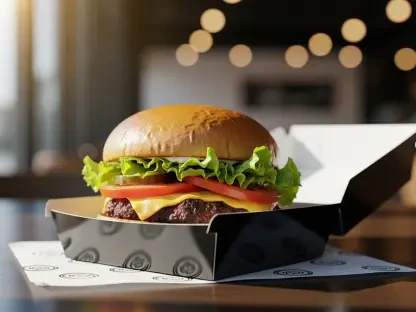Imagine a bustling crowd in San Antonio, Texas, gathered at a historic fast-casual spot, cheering as competitors devour stacks of tacos in a race against the clock. This isn’t just any food fest; it’s a landmark event hosted by Taco Cabana at their Austin Highway location, celebrating over four decades of culinary tradition with a high-stakes eating championship. Aiming for a Guinness World Record and offering a hefty $10,000 prize, this competition has sparked conversations across foodie circles and marketing spheres alike. This roundup dives into diverse perspectives from industry insiders, competitive eating enthusiasts, and branding experts to unpack the significance of this unique spectacle and its impact on both community and commerce.
Unpacking the Event’s Cultural and Culinary Impact
A Celebration Rooted in Texas Heritage
Taco Cabana, a San Antonio staple since 1978, has built a reputation on fresh, made-from-scratch Mexican-inspired dishes, with their Bean and Cheese Taco reigning as a fan favorite. Industry observers note that hosting a world championship centered on this iconic item resonates deeply with local culture, reinforcing the brand’s identity as a Texas treasure. Many see this as a brilliant nod to heritage, blending nostalgia with a modern twist that captures attention beyond state lines.
The event’s design, focusing on a ten-minute taco-eating challenge, has drawn praise for spotlighting a specific menu item rather than a generic food category. Food culture analysts highlight that this specificity strengthens brand recall, making the championship a memorable extension of Taco Cabana’s story. It’s a move that ties directly to their roots while inviting new audiences to experience a piece of Texas tradition.
Community engagement also plays a starring role, as the open registration for Texans fosters a sense of inclusion. Local food bloggers have commented on how this accessibility bridges the gap between professional eaters and everyday enthusiasts, creating a shared celebration. Such inclusivity, they argue, amplifies the event’s appeal as a cultural gathering rather than just a niche competition.
Competitive Eating as Mainstream Entertainment
The rise of competitive eating as a spectator sport hasn’t gone unnoticed, and many enthusiasts view Taco Cabana’s initiative as a timely leap into this growing trend. Fans of the genre point out that events like these transform food into a form of live entertainment, drawing parallels to televised contests like hot dog eating challenges. They believe this championship positions the brand at the forefront of an evolving cultural phenomenon.
However, not all opinions align on the long-term viability of such spectacles. Some sports marketing professionals caution that while the novelty generates buzz, sustaining interest might prove challenging without continuous innovation. They suggest that pairing future events with digital streaming or interactive fan elements could keep the momentum alive, ensuring the championship doesn’t become a one-off gimmick.
A contrasting view from event planners emphasizes the regional enthusiasm in Texas for food-centric gatherings, predicting a strong local following. They argue that the state’s love for bold flavors and big celebrations provides fertile ground for recurring events of this nature. This optimism hints at the potential for Taco Cabana to establish an annual tradition if executed with consistent flair.
Strategic Partnerships and Brand Elevation
Powerhouse Collaborations Driving Success
Taco Cabana’s alliances with Major League Eating and Dr Pepper have garnered significant attention, with many branding specialists applauding the strategic fit. These partnerships bring professional credibility and promotional reach, elevating the event from a local stunt to a nationally recognized showdown. Marketing analysts note that Major League Eating’s expertise in orchestrating high-profile competitions ensures a polished experience for participants and spectators alike.
On the flip side, some logistical concerns have surfaced among event management professionals. They point out that coordinating a large-scale championship with multiple stakeholders introduces risks like timing mishaps or crowd control issues. Despite these hurdles, the consensus leans toward the benefits outweighing the drawbacks, as the event’s visibility offers a rare opportunity to showcase the brand on a global stage.
Consumer behavior experts add that sponsor involvement, particularly from a household name like Dr Pepper, enhances the event’s appeal to a broader demographic. Their perspective focuses on how such collaborations create a festive atmosphere, encouraging attendees to associate positive experiences with Taco Cabana. This synergy, they argue, could translate into increased foot traffic and customer loyalty over time.
Innovative Marketing or Risky Gamble?
Opinions diverge on whether this championship represents a sustainable marketing strategy. Some fast-casual industry leaders commend Taco Cabana for stepping outside conventional advertising, viewing the event as a bold experiment in experiential branding. They suggest that creating memorable moments can forge stronger emotional connections with consumers compared to traditional campaigns.
Others, particularly financial analysts in the restaurant sector, question the return on investment for such an elaborate undertaking. They argue that while the initial hype is undeniable, the costs of execution and prize money might not yield proportional gains unless paired with long-term engagement plans. Their advice centers on leveraging social media recaps and customer testimonials to extend the event’s impact beyond a single day.
A middle ground emerges from digital marketing consultants who see potential in data collection and audience insights gained from the championship. They emphasize that tracking participant and spectator feedback could inform future promotions, turning a one-time event into a springboard for tailored campaigns. This pragmatic take underscores the importance of balancing creativity with measurable outcomes.
Looking Beyond Texas: Expansion and Future Potential
A Blueprint for Broader Markets
As Taco Cabana eyes growth into states like Arizona and Oklahoma, many franchise consultants view the championship as a testing ground for brand visibility in new regions. They suggest that a successful event in Texas could serve as a compelling case study for potential franchisees, demonstrating the chain’s ability to generate buzz and community support. This perspective positions the competition as a strategic tool for expansion.
Contrasting opinions from regional food chain operators highlight the challenges of replicating such an event in markets with different cultural appetites. They note that while Texas has a unique affinity for taco culture, other states might require tailored approaches to achieve similar resonance. Their cautionary stance advises adapting the concept to local tastes rather than assuming a universal appeal.
Growth strategists offer a forward-looking angle, proposing that Taco Cabana could partner with cultural festivals in target states to introduce similar competitions. They believe that embedding the brand within existing community events could ease entry into new territories, building familiarity before standalone championships are attempted. This idea reflects a calculated approach to scaling the concept.
Balancing Tradition with Modern Engagement
Heritage branding experts widely agree that the event aligns seamlessly with Taco Cabana’s identity as a pioneer of fresh Mexican-inspired cuisine. They argue that highlighting a signature item like the Bean and Cheese Taco during a global record attempt reinforces authenticity, a key differentiator in the crowded fast-casual space. This alignment, they say, strengthens customer trust in the brand’s core values.
On the other hand, innovation skeptics within the industry question if nostalgia alone can sustain relevance among younger demographics. They recommend integrating tech-driven elements, such as live leaderboards or app-based voting for fan favorites, to keep the event contemporary. Their input suggests a need to evolve traditional branding tactics to match shifting consumer expectations.
A balanced viewpoint from customer experience analysts focuses on how this championship could inspire a series of milestone celebrations as Taco Cabana grows. They predict that tying future events to significant anniversaries or expansion landmarks could create a rhythm of anticipation among loyal patrons. This strategy, they note, might solidify the brand’s position as a dynamic player in the industry.
Reflecting on a Historic Taco Triumph
Looking back, the Taco Cabana World Taco Eating Championship stood as a vibrant testament to the power of blending culinary heritage with innovative spectacle. Diverse voices from across the food, marketing, and competitive eating landscapes converged on its significance as both a community unifier and a branding milestone. The event not only showcased a beloved Texas chain’s creativity but also sparked debates on the future of experiential marketing in fast-casual dining. Moving forward, regional brands might consider crafting their own themed competitions or forging partnerships with local cultural groups to amplify visibility. Exploring similar food-centric events or diving into Taco Cabana’s ongoing journey offers a chance to draw inspiration and apply these lessons to new contexts.









